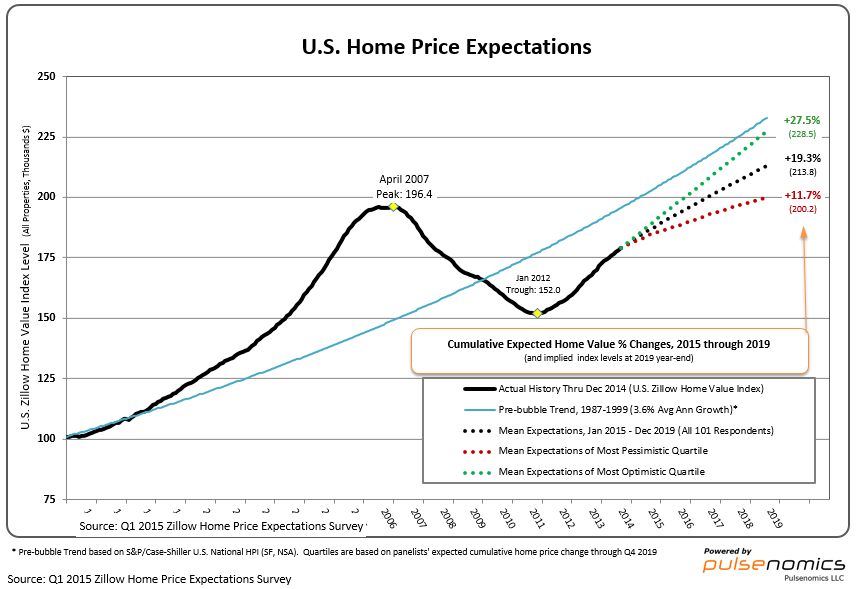- Panelists said they expect U.S. home values to rise 4.4 percent in 2015 on average, to a median value of $187,040.
- Of those with an opinion, the majority of panelists said they expect rental affordability to continue deteriorating for at least another two years.
- On average, panelists said they expect median U.S. home values to exceed their pre-recession peak of $196,400 by May 2017.
Unaffordable rents and slowing home value appreciation are expected to continue for at least the next few years, according to the latest Zillow® Home Price Expectations Survey sponsored by Zillow, Inc. and conducted quarterly by Pulsenomics LLC[i].
Home values grew 6.6 percent in 2014, according to the Zillow Home Value Index, a pace roughly double historic norms of around 3 percent annually. On average, the 101 economists and real estate experts surveyed said they expect the pace to fall by one third by the end of this year, to 4.4 percent, ending the year at a median home value of $187,040. The most optimistic quartile of panelists forecasted a 5.5 percent increase, while the least optimistic quartile projected a 3.1 percent increase in home values this year. The December 2015 Zillow Home Value Forecast calls for 3 percent appreciation in home values.
Overall, median U.S. home values remain below their pre-recession peak of $196,400, but are predicted to surpass that peak by May 2017. Cumulatively, home values are expected to rise 19.3 percent through the end of 2019, although the pace of annual home value appreciation is expected to slow over the next five years, to a 3.1 percent annual growth rate during 2019.
Renting Today, Renting Tomorrow?
Rental affordability, measured by the share of income needed to afford typical rents in an area, has been worsening nationwide for the past several years. In turn, these unaffordable rents are making it difficult for people to save for down payments, particularly younger families and millennial renters already struggling with high student debt and a lack of decent job opportunities.
Because today’s renters are tomorrow’s home buyers, challenges in the rental market have a very strong impact on the for-sale market. Even though many young renters have expressed a desire to own a home and are confident in their ability to one day afford a home, their timelines may be lengthened as they take longer to accumulate down payments.
According to the panel, this trend is expected to continue for the near- to mid-term. Of the experts with an opinion, 51 percent said they expect rental affordability to continue deteriorating for at least another two years.
Solving the rental affordability problem will not be easy, but the majority of panelists with an opinion feel that it is better left to market forces rather than expecting federal or local government intervention. More than half (52 percent) of the respondents with an opinion on this issue said the market will correct the nation’s soaring rents over time, and no government intervention is required. About one-third (35 percent) of respondents said rising rents are not a problem. [ii]
[i] This edition of the Zillow Home Price Expectations Survey surveyed 101 experts between Jan. 20 and Jan. 29. The survey was conducted by Pulsenomics LLC on behalf of Zillow, Inc. Over 100 housing experts were surveyed.
[ii] Respondents were asked: “For today’s tenants who aspire to own a home, rising rent payments have been making it more difficult to save for a down payment and become tomorrow’s home buyers. Which of the following choices best reflects your view?” Of survey respondents with an opinion, 52 percent said markets would address this problem. Three percent said it requires government intervention, and 35 percent said it is not a problem.
